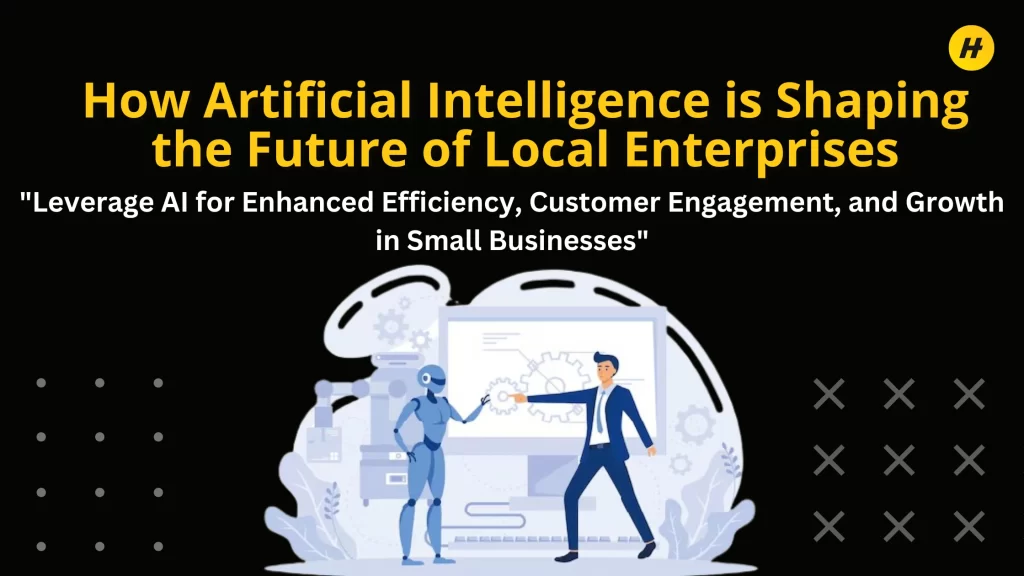Artificial Intelligence (AI) is no longer a futuristic technology reserved for large corporations. It has become increasingly accessible to small businesses, transforming how they operate, engage with customers, and compete in a digital-first economy. While AI was once seen as too expensive or complex for smaller operations, new tools and platforms have made it easier for even the smallest enterprises to leverage the power of AI for growth and efficiency.
This blog explores how AI is being integrated into various aspects of small businesses and highlights the innovative ways in which entrepreneurs can harness AI technology to stay ahead of the competition.
1. AI in Customer Service: The Rise of Chatbots
Small businesses can now offer 24/7 customer support without the need for a large team. AI-powered chatbots are revolutionizing customer service by answering frequently asked questions, assisting with product recommendations, and even processing orders—all without human intervention.
How It Benefits Small Businesses:
- Cost Savings: By reducing the need for full-time customer service representatives, AI chatbots can significantly lower operational costs.
- Enhanced Customer Experience: Customers get immediate responses to their inquiries, improving satisfaction and retention.
- Scalability: AI chatbots can handle multiple customer interactions simultaneously, allowing businesses to serve more customers without added staffing.
2. AI-Driven Marketing for Personalized Campaigns
In today’s competitive market, personalization is key to standing out. AI tools can analyze customer data to predict buying patterns, preferences, and behaviors, allowing small businesses to create highly personalized marketing campaigns. This can include sending targeted emails, offering product recommendations, or even delivering personalized social media ads.
How It Benefits Small Businesses:
- Improved Targeting: AI-driven marketing ensures that businesses reach the right audience with the right message at the right time.
- Higher Conversion Rates: Personalized campaigns are more likely to result in conversions, increasing sales and profitability.
- Data-Driven Decisions: AI helps businesses understand their customers better through data analysis, leading to more informed marketing strategies.
3. AI for Inventory Management and Supply Chain Optimization
For small retail and e-commerce businesses, managing inventory efficiently can be a daunting task. AI-powered systems can help automate inventory management by predicting stock levels, optimizing supply chains, and reducing the risk of overstocking or stockouts.
How It Benefits Small Businesses:
- Reduced Waste: By predicting demand accurately, businesses can avoid overstocking and reduce waste.
- Streamlined Operations: AI can automate reordering processes, ensuring that businesses always have the right products available.
- Cost Efficiency: Optimizing the supply chain can lead to reduced shipping costs and faster delivery times, improving both customer satisfaction and margins.
4. AI in Financial Management: Automating Bookkeeping and Invoicing
Managing finances is one of the most time-consuming aspects of running a small business. AI-powered financial tools can automate bookkeeping tasks, send invoices, track expenses, and even predict future cash flow, allowing business owners to focus on growth rather than administrative tasks.
How It Benefits Small Businesses:
- Time Savings: AI can automate repetitive tasks, freeing up time for business owners to focus on other areas.
- Error Reduction: Automated financial tools can minimize human errors in bookkeeping, ensuring more accurate financial records.
- Predictive Insights: AI can analyze financial data to predict cash flow, helping businesses make smarter investment and budgeting decisions.
5. AI for Competitive Analysis: Gaining a Market Edge
Staying ahead of competitors is crucial for small businesses, and AI can help by analyzing market trends, competitors’ activities, and customer sentiment. AI-powered tools can monitor social media, review sites, and other online platforms to provide insights into what competitors are doing and how customers are responding.
How It Benefits Small Businesses:
- Real-Time Insights: AI can provide real-time data on competitors’ marketing strategies, product launches, and customer feedback.
- Strategic Planning: Armed with AI-driven insights, small businesses can make data-informed decisions to stay ahead of the competition.
- Improved Product Development: Understanding customer sentiment through AI analysis allows businesses to refine their products and services based on real-time feedback.
6. AI-Powered Personal Assistants for Small Business Owners
Running a small business often means wearing multiple hats, from managing operations to marketing and customer service. AI-powered personal assistants like Siri, Alexa, and Google Assistant can help streamline tasks such as scheduling meetings, sending reminders, and managing to-do lists, making it easier for business owners to stay organized and focused.
How It Benefits Small Businesses:
- Increased Productivity: AI assistants can handle administrative tasks, allowing business owners to focus on higher-priority tasks.
- Task Automation: From sending emails to setting up meetings, AI personal assistants help automate everyday tasks, saving time and reducing stress.
- Accessibility: These AI tools are accessible to businesses of all sizes, with minimal investment needed to start benefiting from their features.
Conclusion
AI is no longer an unattainable technology for small businesses. In 2024, the integration of AI into small business operations will be the key to staying competitive and improving efficiency. From customer service chatbots to AI-powered financial tools, small businesses can harness the power of artificial intelligence to streamline processes, reduce costs, and enhance customer experiences. Entrepreneurs who adopt AI early on will have a significant advantage as the technology continues to evolve.
At Hoora, we understand the importance of innovation and efficiency for small businesses. By incorporating AI into your business model, you can unlock new opportunities and set yourself up for long-term success.










